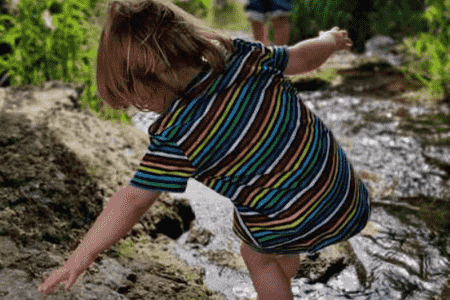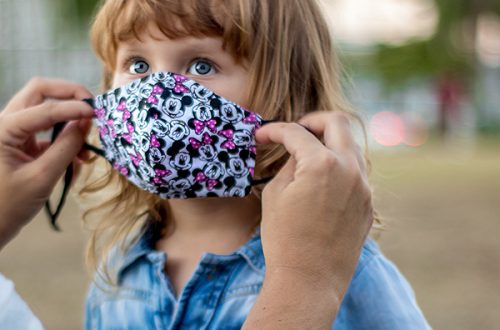Happy Healthy Kids
Eight Reasons to Embrace Outdoor Play
By Jan Pierce
Are you one of those parents who wonder if your child’s schedule is too crowded? Too stressful? Do you watch him play video games by the hour and get a little nervous about the long-term effects? Do you wish she had time to “just play” rather than run from school to lessons to team practices?
If you can relate to the above situations, you’re in good company. It seems today’s busy lifestyles don’t allow much time for healthy, unstructured outdoor exploration and play.

As a culture, our children are paying the price in increased anxiety, poor sleep habits, and a higher degree of difficulty with attention and engagement in learning situations. Kids seem fidgety, easily bored, unable to focus.
Take a deep breath. Remember how it used to be when children played freely without a lot of oversight and adult intervention. Can you recall the days when you scraped your knee and just got up and kept playing? When you could sit under a tree and inspect the intricacies of the natural world? When you could dig and build with natural objects? When it seemed there was all the time in the world to just be.?
Today’s children need those same healthy, authentic play experiences. They need time to explore the out of doors, time to think and dream. Time to wonder and experiment.
How to begin? It’s easier than you might think. Just unplug and send the kids outside. They won’t need an agenda or directions. Once they find themselves in the great outdoors, they’ll do the rest.
Here are eight benefits of unstructured, outdoor play. And they’re important.
1. Authentic Play
Today’s kids are steeped in a virtual world. They’re adept at computer use, coding, programming and the like, and that’s fine. They need to understand the technological world. But they also need authentic, hands-on experiences that can’t be had in a classroom or computer lab. They need to be grounded in the real world and able to engage in real-life experiences. They need to do real-time observation, exploration and interaction with the real world. They need the sensory experiences of watching a bird find a worm, of tracking the tiny veins and capillaries on a leaf, of squishing dirt and water together into mud. Kids need to play self-created games and make up their own rules apart from adult supervision. They need to learn how to try and fail and try again to make their play creations work.
2. Enhanced Decision-Making
Children need to know how to listen and follow directions in the classroom and in other activities such as sports. But they also need the opportunity to play independent of adult oversight. They need to decide to create something or explore something and then make their own plan. They need to cooperate with others to follow the rules to their own kid-made games. They need the freedom to adapt rules to their current situation and then evaluate whether or not their plan worked. All of these skills are strengthened when kids are allowed to play outside independently.
3. Active vs. Sedentary Play
We all know the statistics on the overall health of today’s kids. Too many are overweight and unfit. Too many are lethargic and uninspired. In short, many of our kids don’t move enough to be happy and healthy. But knowing isn’t the same as doing. Parents need to push through a bit of resistance and insist that our children go outside whether it’s for time in their own backyard or access to a larger natural environment. While parks can offer some of the necessary ingredients to healthier play, wilder natural environments such as hiking trails or woodlands are even better. Nothing inspires kids to build forts and create their own games more than an untouched-by-man setting.
4. Room for Wonder and Joy
Watching spiders spin a web. Catching grasshoppers in a jar. Hearing birds sing in the trees and seeing them drop bits of food into the open beaks of their hatchlings. Wandering a beach, picking up beautiful shells or bits of driftwood, smelling the scent of grasses on a warm summer day. We all need opportunities to absorb the wonder of nature and to experience the joy of being part of the natural world. Give your kids the chance to do these simple things. They’ll benefit immensely.
5. Better Classroom Performance
Some schools are experimenting with longer recesses and more frequent breaks in their school day and wonder of wonders, every one of them reports better behavior and engagement in the classroom. When kids are given enough time to move and play, they’re better able to focus their attention on classroom work. They feel better, they perform better. It’s not rocket science. In other studies, it’s reported that children who play more outside get a better night’s sleep. A well-rested child is better able to focus attention and “get into” lessons in class. Children who get enough chances for active play feel more content and happy. Happier kids have lower levels of stress which produces better classroom performance.
6. Self-reliance Through Exploration
We like it when our children are able to follow directions—when they’re “coachable,” and that is an important skill. But it’s also important for kids to learn how to operate via their own internal rules and understandings. Children benefit when they’re able to manage their own behaviors based on their convictions, when they can make a plan and follow it through. When they can try and fail and try again to accomplish a task. All of these skills can only be practiced when kids have the chance to engage in unstructured play free of adult supervision and oversight. It may be hard to break the pattern of over-managing our kids’ lives, but it’s vital that we do so.
7. Improved Social Skills and Interaction
If you’ve ever watched a group of kids play a game of softball you might see more arguing about the rules than actual play. But what you’re seeing is social skills in the making. Older kids will make the rules and try to enforce them. Quieter kids will be given chances to play (or not) and bossy kids will try to run the show. In the middle of the chaos, children will learn how the world of rules works and they’ll play a little ball too. When children are free of adult supervision, they build leadership skills and learn to work as a community. Is it pretty? Not always, but there are always lessons learned. In some of the school where increased free play has been introduced with fewer rules and the attitude of “safe enough,” the children earlier seen as bullies have emerged as leaders. Why? Because they’ve been successful in more active, hands-on play and have been given the chance to expend pent-up energy in all-out activity.
8. Improved Mental Health
The rise in mental health problems amongst kids as young as pre-school is a testament to our over-managed, over-tested and earlier to learn environment. The skills that used to be taught in first grade must now be mastered in Kindergarten. The results are children with a too-hurried and too stressful world. There will always be expectations in the learning world, but for those children who enjoy more free time, more authentic outdoor fun and more opportunity to run and play, the better they’ll feel about themselves and their life. We give our children a great gift when we encourage and champion free play in the great out of doors.
Jan Pierce, M.Ed., is a retired teacher and the author of Homegrown Readers and Homegrown Family Fun. Find Jan at www.janpierce.net.
Resources
Elkind, D., The Hurried Child: Growing Up Too Fast Too Soon, 3rd edition, Cambridge, MA, 2001.
Erickson, R.J. Play Contributes to the Full Emotional Development of the Child, Education, 1985.
Ginsburg, Kenneth R. MD, MSED, The Importance of Play in Promoting Healthy Child Development and Maintaining Strong Parent-child Bonds, AMA, 2006.
Piaget, J. Play Dreams and Imitation in Childhood, Norton, New York, 1962.
Vygotsky, L. Play and Its Role in the Mental Development of the Child, Social Psychology, 1967.






